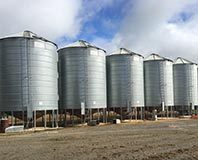Read the latest information on
Foot-and-mouth disease
 Despite recent heavy rain damaging or even destroying some crops, the 2016 grain harvest is approaching fast and thoughts should turn to preparing for harvest to maximise yield and financial return.
Despite recent heavy rain damaging or even destroying some crops, the 2016 grain harvest is approaching fast and thoughts should turn to preparing for harvest to maximise yield and financial return.
Jim Moran, Grains Biosecurity Officer in Victoria, says that now is the time to perform critical hygiene maintenance on harvesting machinery and grain storage equipment.
“Simple hygiene measures are the best way to protect your freshly harvested grain and your financial return”, advised Jim.
Make sure harvesting and handling equipment are all clean and free from the remnants of the last harvest. It can be difficult to get all grain residues out of augers, field bins and headers if they have been sitting for a while, but it’s an important thing to do because the old grain may have a build-up of pests.
Harvesting contractors too need to follow hygiene protocols.

Speak to Jim Moran about harvest hygiene now to protect the value of your grain.
“If you haven’t used the contractor before, it’s a good idea to inspect their equipment before they enter the production areas of your farm,” said Jim.
“When it comes to storage, you need to start with an insect free environment before the new grain is introduced.”
Both long and short term storages can harbour diseases or insects feeding on the remnants of grain.
“Avoid putting fresh grain on top of carry-over grain to prevent the new grain from being contaminated by insects. If you need to, ask for advice from an expert about chemical treatments so you don’t run into problems with chemical registration, insect resistance or residues on grains.”
Storing grain is a complex operation, and Jim says there are a few critical things to seek advice about and to do now, which include:
For help on grains farm hygiene, contact Jim Moran in Epsom on 03 5430 4479. The Grains Research and Development Corporation website (grdc.com.au) has excellent fact sheets on all aspects of storing grain on farm.
And remember, if you find anything unusual in your silos don’t hesitate to report it to your agronomist or the Exotic Plant Pest Hotline on 1800 084 881.